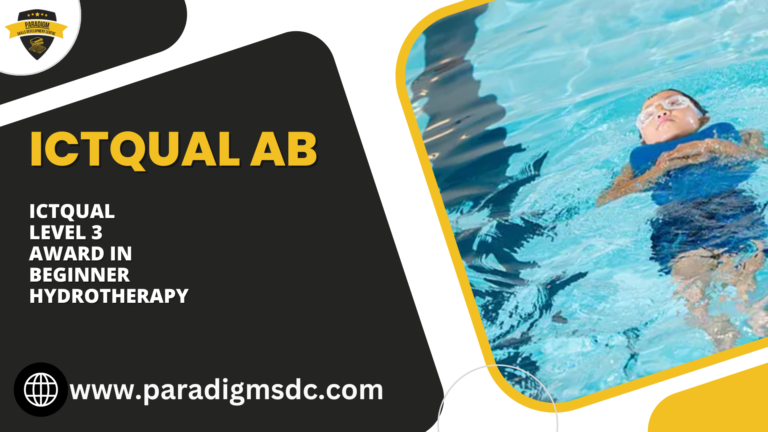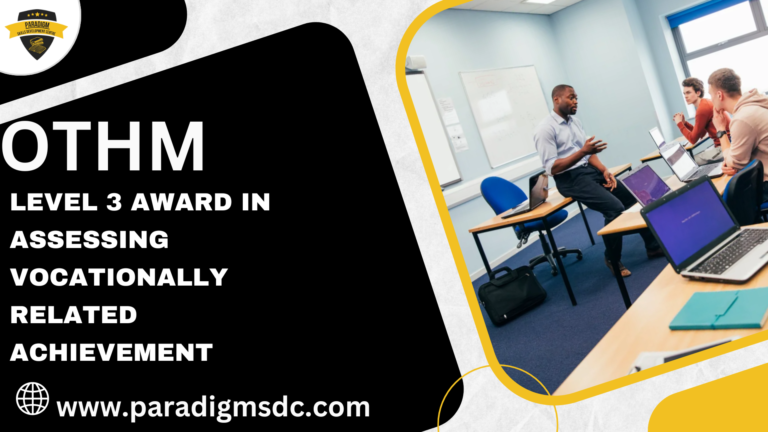Course Introduction
The ICTQual Level 3 Award in Supporting Individuals with Intellectual Disabilities and Mental Illness is a specialized training program aimed at enhancing the capabilities of those who work directly with individuals experiencing intellectual disabilities and mental health conditions. This course covers best practices for providing support, promoting independence, and ensuring the well-being of individuals in various settings.
Course Overview
This course integrates theoretical knowledge with practical application, providing participants with a thorough understanding of how to support individuals with intellectual disabilities and mental illness. The curriculum includes interactive modules, case studies, and practical exercises to ensure that learners acquire both foundational knowledge and hands-on experience in delivering high-quality care.
Course Study Units
- Understanding Intellectual Disabilities and Mental Illness
- Effective Communication Techniques
- Person-Centered Support
- Legal and Ethical Considerations
- Health and Well-being
- Crisis Intervention and Management
- Working with Families and Carers
Learning Outcomes
Upon completing the ICTQual Level 3 Award in Supporting Individuals with Intellectual Disabilities and Mental Illness, participants will be able to:
Understanding Intellectual Disabilities and Mental Illness
Learning Outcomes:
- Demonstrate a clear understanding of various intellectual disabilities and mental health conditions, including their definitions and classifications.
- Identify and explain the causes, risk factors, and symptoms associated with intellectual disabilities and mental illnesses.
- Assess the impact of these conditions on individuals’ daily lives and development.
- Recognize and address common stigmas and misconceptions related to intellectual disabilities and mental illnesses.
Effective Communication Techniques
Learning Outcomes:
- Apply effective communication principles to interact with individuals with intellectual disabilities and mental illnesses.
- Utilize verbal and non-verbal communication techniques to enhance understanding and rapport.
- Implement active listening skills to ensure individuals feel heard and valued.
- Overcome common communication barriers using appropriate aids and technologies.
Person-Centered Support
Learning Outcomes:
- Explain the principles of person-centered care and how they apply to supporting individuals with intellectual disabilities and mental illnesses.
- Develop and implement personalized support plans that reflect the individual’s preferences, needs, and goals.
- Facilitate individuals’ involvement in their own care and decision-making processes.
- Monitor and evaluate the effectiveness of support plans, making adjustments as necessary.
Legal and Ethical Considerations
Learning Outcomes:
- Understand and articulate the legal rights of individuals with intellectual disabilities and mental illnesses.
- Maintain confidentiality and data protection in all aspects of care.
- Apply ethical principles in support work, ensuring the dignity and respect of individuals.
- Implement safeguarding measures to protect vulnerable individuals from harm.
- Navigate issues related to consent and capacity, ensuring informed decision-making.
Health and Well-being
Learning Outcomes:
- Assess and support the physical health needs of individuals with intellectual disabilities and mental illnesses.
- Promote mental well-being through appropriate interventions and activities.
- Recognize signs of health deterioration and respond promptly.
- Encourage and support healthy lifestyle choices, including proper nutrition and exercise.
- Facilitate access to necessary healthcare services and resources.
Crisis Intervention and Management
Learning Outcomes:
- Identify potential crises and early warning signs in individuals with intellectual disabilities and mental illnesses.
- Apply de-escalation techniques to manage and mitigate crises effectively.
- Execute emergency response procedures to ensure the safety of all involved.
- Provide appropriate support to individuals during and after a crisis.
- Develop post-crisis support plans to aid in recovery and prevent recurrence.
Working with Families and Carers
Learning Outcomes:
- Build and maintain effective relationships with families and carers of individuals with intellectual disabilities and mental illnesses.
- Understand the dynamics and challenges faced by families and carers.
- Offer support and resources to families, enhancing their ability to care for their loved ones.
- Resolve conflicts and facilitate open, respectful communication within the family unit.
- Collaborate with families and carers in care planning and decision-making processes.
Course Benefits
- Comprehensive Knowledge: Gain an in-depth understanding of intellectual disabilities and mental illness.
- Practical Skills: Develop hands-on skills through interactive training and real-world scenarios.
- Enhanced Competence: Improve your ability to provide effective, compassionate support in various settings.
- Career Development: Enhance career prospects in healthcare, social care, and support roles.
- Improved Outcomes: Contribute to better outcomes for individuals with intellectual disabilities and mental health conditions.
Who Is This Course For?
The ICTQual Level 3 Award in Supporting Individuals with Intellectual Disabilities and Mental Illness is ideal for:
- Healthcare professionals, including nurses and mental health workers.
- Support staff and caregivers in residential or community settings.
- Social workers and case managers involved in supporting individuals with intellectual and mental health needs.
- Family members and volunteers providing care and support.
- Students and trainees in healthcare, social care, or related fields.
Future Progression
Upon completing the ICTQual Level 3 Award in Supporting Individuals with Intellectual Disabilities and Mental Illness, participants can further their education and career development through:
- Advanced Training Programs: Pursue higher-level qualifications in mental health support, social care, or special education.
- Specialized Certifications: Obtain certifications in areas such as behavioral management, autism support, or advanced mental health care.
- Higher Education: Enroll in undergraduate or postgraduate programs in social work, psychology, or healthcare management.
- Professional Development: Engage in additional training or workshops on specific topics related to intellectual disabilities and mental health.
- Leadership Roles: Progress to supervisory or managerial positions within care organizations or community services.
The ICTQual Level 3 Award in Supporting Individuals with Intellectual Disabilities and Mental Illness is a vital course for anyone dedicated to providing exceptional support to individuals with complex needs. Equip yourself with the skills and knowledge to make a meaningful difference in the lives of those you support and advance your career in the field of care and support.







